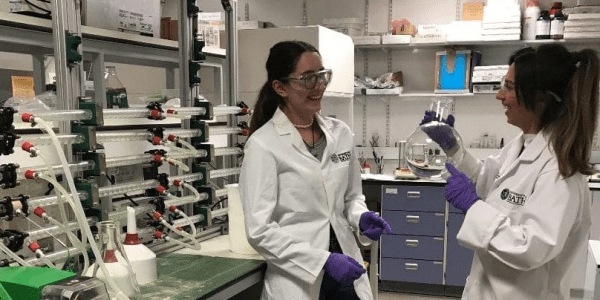Christopher Hebbes’ placement at the University of Wales College of Medicine, Cardiff
| Nuffield Research Placement student, 2000
University of Wales College of Medicine, Cardiff Heat Shock Protein 70 (HSP70) in patients with AITD |
|---|
I worked on a project looking at the expression of Heat Shock Protein 70 (HSP70) in patients with autoimmune thyroid disease (AITD), using a technique known as High Performance Liquid Chromatography (HPLC) and Western Blotting. These techniques enable the separation and identification of specific proteins from a mixture. This was based on the hypothesis that the HSP70 shared amino acid sequences with key proteins within the thyroid. If the immune system recognised part of the sequence on HSP70, and developed antibodies to this, those antibodies could also attack the thyroid gland, leading to thyroid disease. This was thought to occur more in stressed states, providing a potential mechanism for a link between the brain and immune system in this disease.
What was the highlight/best bit of your placement?
This was my first experience of lab-based clinical research. At the time, I remember enjoying the chance to use different pieces of laboratory equipment. It all seemed much more technical than the equipment that we had at school and more exciting!
NRP is the door to a great world of university science, access to equipment that just isn’t practical outside that environment. Take every opportunity offered to you and, while it might seem difficult and scary writing a report and giving a presentation, it’s well worth it.”Christopher Hebbes
What is your current role? If you are currently studying, what course are you doing?
I am a medical doctor, working in Intensive Care and Anaesthesia, training to be a consultant. I’m slightly unusual in that I have a part-time research job as well at the University of Leicester, where I am researching the role of a particular brain protein on immune cell function – not such a different area to my original project!
As part of my research, I’m studying for a PhD part-time, alongside my clinical work. It’s hard work, but I enjoy having something completely different to medicine to work on and think about. It also gives me an understanding of how research works in the NHS and how we can use the findings of studies to benefit patients.
What path did you take after finishing your NRP and how has that led you to where you are today?
I had always intended to study medicine but was keen to do more research along the way. The University of Leicester allows medical students to take an extra year to do an intercalated BSc degree, either taught or to undertake a laboratory-based project under supervision. I worked on a project looking at a new type of brain protein, called Nociceptin, and possible drugs to interact with it. During that year I learned a lot of research techniques, developed a taste for research, scientific writing and presentations, and then went back to my medical studies.
I completed the first few years of my medical training and then studied part-time for an MMEdSci at the University of Nottingham working in Medical Education research. That opened my eyes to qualitative research – ways of answering the hows and whys of human behaviour. After my MMedSci, I completed more medical training and decided that I wanted to do some more lab research. I took up a post in the same department as my BSc, working on Nociceptin in sepsis, which I am continuing at the moment.
Did your Nuffield Research Placement have an effect on the choices that you made after finishing school/college/university?
I think having some experience of research in a university and some of the techniques available definitely gave me a taste for what I could do. Medical training is very science-based and, while research is important, as a medical student, lab-based practicals aren’t a major part of the curriculum, so I would not have had exposure to them if I hadn’t completed my NRP.
If you could give one piece of advice to Nuffield students about to start a placement what would it be?
NRP is the door to a great world of university science, access to equipment that just isn’t practical outside that environment. Take every opportunity offered to you and, while it might seem difficult and scary writing a report and giving a presentation, it’s well worth it.
What would your advice be to young people thinking about a career in STEM?
My research and medicine career so far has been very varied. I have been fortunate to work in lab-based, clinical and qualitative areas of research. Science is so much more than the practicals at school; I believe that there is a career for everyone, that you won’t always see until after school (and even after university).
Did you stay in touch with your supervisor?
I haven’t remained in touch with my supervisor – although every so often you come across people that are very influential to you. My BSc supervisor, Prof Dave Lambert, has gone on to supervise my PhD, and we continue working together. I’ve no doubt that the NRPs will forge lifelong collaborations for some students.



